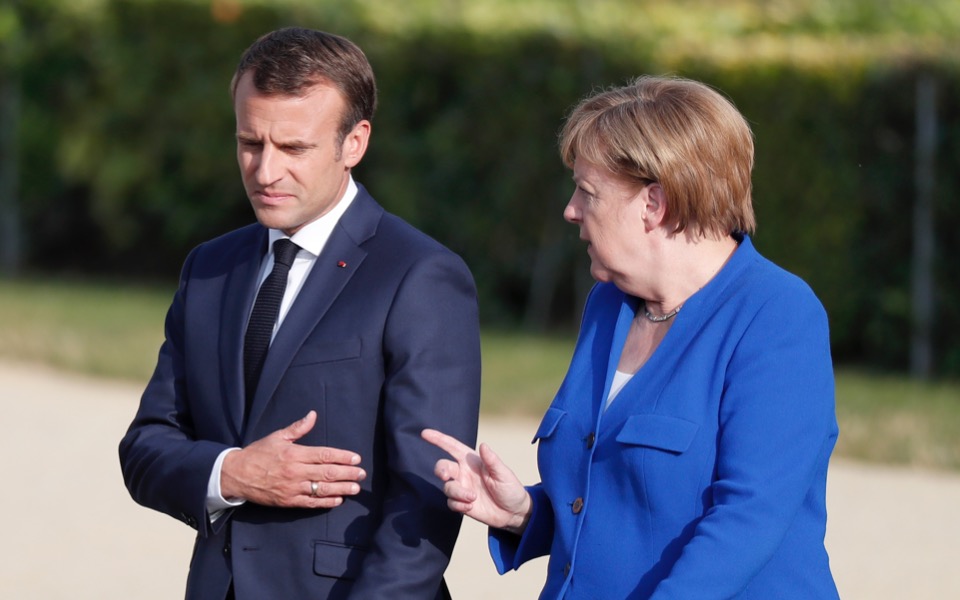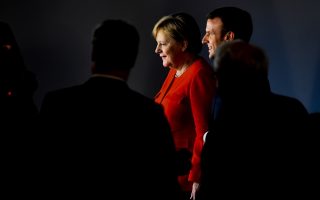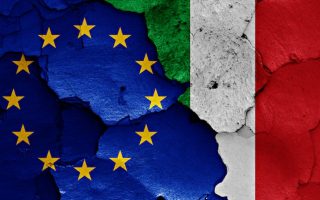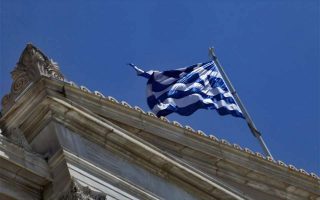The new dividing line in Europe is Merkron vs Orbvini

“The Strange Death of Liberal England” is one of the most famous history titles in the English language. Are we now witnessing the strange death of liberal Europe? As anti-liberal populism grips the very heart of Europe, threatening even the throne of Germany’s Chancellor Angela Merkel, the danger is in plain view.
There is a new political dividing line in Europe, at least as important as the line old between left and right. It splits existing parties and throws up new ones. It opens new fronts between nations as well as parties. On the one side, there is the camp of Merkron, on the other, that of Orbvini.
For all the important differences between Merkel and Emmanuel Macron on issues such as the eurozone, they both favor liberal, European solutions, based on international cooperation, inside the EU and globally. Hence Merkron. For all the differences between Hungarian leader Viktor Orban and the Italian populist Matteo Salvini, they both advocate illiberal, national solutions, scapegoating, excluding or expelling ethnically or culturally defined “others.” Hence Orbvini. Spain’s socialist Prime Minister Pedro Sanchez and European Council President Donald Tusk clearly belong in the Merkron camp, while the Bavarian CSU, Austrian Chancellor Sebastian Kurz, Jaroslaw Kaczynski’s Law and Justice party (PiS) in Poland, and some (though not all) Brexiteers belong under the checkered standard of Orbvini.
The battle between Merkronismus and Orbvinismo will shape European politics over the next year. As politicians limber up for next summer’s European elections, the biggest party grouping in the European Parliament, the European People’s Party (EPP), is desperately clinging on to Orban’s Fidesz party, and has even been making furtive overtures to Poland’s PiS, for fear of the Orbvini camp forming a new alliance to compete with it. Playing off the name of his party, the Lega (League), Salvini threatens “a League of the Leagues of Europe.” It’s been a long time since a European election was so unpredictable.
By no means all the fractures inside the EU can be neatly situated along the Merkron-Orbvini axis. Disagreements about the eurozone and the next European budget, for example, fall more along national than political lines. Brexit is 27 countries against one. But in terms of the way national democratic politics play into European politics, this is the new game in town.
At the moment, team Orbvini is clearly on the advance. Team Merkon looks tired and defensive, like the German and Spanish football teams in the World Cup, doggedly playing their systems but not breaking through to score. The issue of immigration, around which the camp of Orbvini gathers its troops, is both a real and a symbolic one.
As a result of what the dissident balladeer Wolf Biermann vividly calls Merkel’s “wonderful mistake” in 2015, a great many refugees did come to Germany in a very short space of time. A great many East Europeans did come to Britain after EU enlargement in 2004, and real concerns about housing, employment, healthcare and schools contributed to the Brexit vote. Italy, Spain and Greece have genuinely been struggling, with little help from their North European partners, to accommodate large influxes of both classic refugees and people who risk a watery death in the Mediterranean in the hope of a better life in Europe.
But immigration is also a symbolic issue, gathering concerns about culture and identity like metal filings around a magnet. It is right to note that levels of uncontrolled immigration into the EU have fallen dramatically since 2015. But that does not address how people feel their countries have already changed. In a poll conducted by the Bertelsmann Foundation in 2017, an EU-wide average of 50 percent of those asked agreed with the statement “There are so many foreigners in our country, sometimes I feel like a stranger.” In Italy the figure was 71 percent.
British-born American historian George Dangerfield argued that the Liberals declined in early 20th-century England because they failed to respond to large new forces, including the movement for women’s suffrage, the Labour movement and Irish nationalism. A hundred years on, the crisis of liberal Europe is in large part a result of forces that liberalism itself has created. Liberalization, Europeanization and globalization have between them produced rapid, visible change in European societies.
For too many, it has not felt like change for the better. Exploiting these discontents, the populists tell a simplistic story about how pulling up the national drawbridge and “taking back control” will result in the restoration of an imagined golden past of good jobs, happy families and a more traditional national community. Meanwhile, the digital revolution, now advancing through machine learning towards artificial intelligence, means there will be even more disruptive change and insecurity, especially in the workplace.
The liberal fightback in Europe therefore faces a formidable task-list. It will be difficult enough to find rational, practical answers to the real problems of inequality and insecurity. This may require radical policies, such as a universal basic income or a basic job guarantee. Faced with a rapidly moving target, because of the pace of the digital revolution, we are only at the very beginning of working those answers out. Even if you have a new John Maynard Keynes, it takes time to get from the intellectual work of a Keynes to the election-winning program of a Labour Party under Clement Attlee.
Beyond this, liberal Europe has to find ways of addressing those deep emotional needs for community and identity which populists exploit. As you can see in every World Cup football crowd, national identity remains an incomparable source of passion and belonging. For the foreseeable future, it is an illusion to believe that any transnational or supranational identity can compete. So, while doing everything we can to strengthen a shared European identity, and indeed a global one (which the World Cup in some sense also represents), we cannot abandon the emotional appeal of the nation to the nationalists. We need a positive, civic patriotism, of the kind Macron is promoting in France, to complement Europeanism and globalism.
Then you have to weld all this into an election-winning program, and have a party to win the election with that program. But we don’t have many of those parties either. Macron, with his Republique en Marche movement, is the exception that proves the rule. Everywhere else, liberals have been losing out to more illiberal tendencies in mainstream parties of center-right and center-left, including Britain’s Labour and Conservatives. Or center-right parties have only retained power by appeasing the more illiberal approaches of their populist coalition partners, as in Austria and the Netherlands.
All this leads me to conclude that the fightback of liberal Europe will take quite a few years. Things will probably get worse before they get better, with more goals for Orbvini and setbacks for Merkron. No, I don’t believe we are witnessing the strange death of liberal Europe, but we must gird ourselves for a long, hard-fought recovery.
Timothy Garton Ash is professor of European Studies at Oxford University, where he leads the Free Speech Debate project (freespeechdebate.com), and a senior fellow at the Hoover Institution, Stanford University. His latest book is “Free Speech: Ten Principles for a Connected World.”





